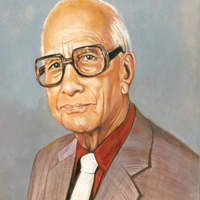Ghanshyam Das Birla
Ghanshyam Das Birla, founder of the Birla empire, was a man of many parts
It is often said that the biggest reason for GD’s business success was his sixth sense for being in the right business at the right time.
Ghanshyam Das Birla, GD, as he was fondly referred to, had financed political parties but only once run for a political office, set up colleges though his own formal education stopped at age 11, built temples but preferred his own house for meditation and starting as a jute broker 70 years ago, created a business domain worth over Rs 1,000 crore in his lifetime.
At the age of 18, GD’s grandfather Shiv Narayan Birla set out from his village in Rajasthan to make his fortune in Bombay as a moneylender. By the time GD was born, on April 5, 1894, the family was well established. Later, as a young man, GD wanted to diversify the family business into manufacturing. GD left for Calcutta in Bengal Presidency, the world’s largest jute-producing region, and began independently as a jute broker. In 1918, he established the Birla Jute Mills, which irked the established European merchants, whom the biased policies of the British government favoured. GD had to scale a number of obstacles as the British and Scottish merchants tried to shut his business through unethical and monopolistic means, but he was able to persevere. When World War I resulted in supply problems throughout the British Empire, Birla’s business skyrocketed. With an investment of Rs 5 million in 1919, the Birla Brothers Limited was formed. A mill was set up in Gwalior the same year.
In 1926, he was elected to the Central Legislative Assembly of British India. He became the founding president of Harijan Sevak Sangh founded by Mahatma Gandhi in Delhi in 1932 .
In the 1940s, he ventured into the territory of cars and established Hindustan Motors. After independence, Birla invested in tea and textiles through a series of acquisitions of erstwhile European companies. He also expanded and diversified into cement, chemicals, rayon and steel tubes. Ghanshyam Das Birla during the Quit India Movement of 1942, had conceived the idea of organising a commercial bank with Indian capital and management, and the United Commercial Bank Limited was incorporated to give shape to that idea. UCO Bank, formerly United Commercial Bank, established in 1943 in Kolkata, is one of the oldest and major commercial bank of India. Envisioning infrastructural development in his hometown, Birla founded the Birla Engineering College (rechristened as Birla Institute of Technology and Science in 1964) in Pilani and the Technological Institute of Textile & Sciences in Bhiwani among other educational institutions in 1943. Although business always absorbed his mind, his heart was from the beginning captured by Mahatma Gandhi. Once, Mahatma Gandhi wrote to Birla: “God has given me many mentors and you are one of them.” In turn, Birla said about Gandhi: “Whatever sums he asked from me he knew he would get, because there was nothing that I would refuse him.” Birla was the link between the imperial government and Mahatma Gandhi to promote better understanding. In 1957, he was awarded India’s second-highest civilian honour, the Padma Vibhushan by the Government of India. Birla was a close associate and a steady supporter of Mahatma Gandhi. Gandhi stayed at Birla’s home in New Delhi during the last four months of his life.

Ghanshyam Das Birla
Date of Birth: 10 Apr 1894
Birth Place: Pilani
Proffession: founder of the Birla empire
Nationality: Indian
Death: 11 June 1983, London, United Kingdom


